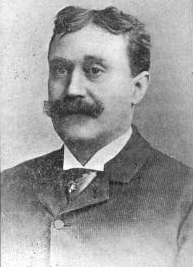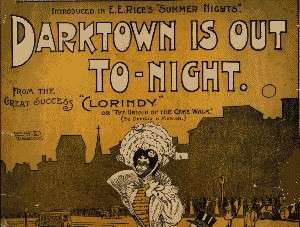Edward E. Rice
| Edward Everett Rice | |
|---|---|
 | |
| Born |
December 21, 1847 Brighton, Massachusetts |
| Died |
November 16, 1924 (aged 76) New York City, United States |
Edward Everett Rice (December 21, 1847 – November 16, 1924) was an American musical composer and theater producer active during the late 19th and early 20th Centuries, known primarily for being a pioneer of American musical theater and introducing to Broadway a musical by African-American writers and performers.[1]
Biography
Edward Everett Rice was born in Brighton, Massachusetts to Edmund Rice and Martha A. (Fletcher) Rice. Rice married Clara E. Rich, daughter of Isaac E. Rich, in 1869 and they had a daughter Carrie B. Rice (b. 1870) and sons, Aubrey L. Rice (b. 1876) and Anthony D. Rice (b. 1876).[2][3]

Living in New York City in the early 1870s, Rice was employed as a clerk with the Cunard Steamship Company when he saw the English production of The Black Crook and became interested in the idea of creating an American musical.[4] In 1874 Rice and J. Cheever Goodwin were the creators of an extravaganza, Evangeline; or, The Belle of Acadia, a musical burlesque of Henry Wadsworth Longfellow's Evangeline, that became the first American production billed as a musical comedy.[5][6] Rice composed the music for more than eighteen productions that appeared on Broadway, including Hiawatha and Summer Nights, that toured the country. Rice had no formal musical education and he could not read sheet music, but he played by ear on the piano. His method of composition would be to "dictate" to a scribe tunes that he would play on the piano, and he would make suggestions for orchestration.[4]
As a producer, Rice introduced popular performers Pauline Hall, Lillian Russell, and Fay Templeton, and in 1898, he booked Clorindy, or The Origin of the Cake Walk by Will Marion Cook and Paul Laurence Dunbar, one of the earliest musicals by African Americans and the first to appear on Broadway at the prestigious Casino Theatre.[7][8] Rice's biggest hit was 1894's Adonis, which starred Henry Dixey, one of the most popular performers of the era.[1] He produced the "burlesque extravaganza" musical 1492 Up To Date in 1893 in New York City. Rice's final Broadway production was a 1904 revival of the British musical Mr. Wix of Wickham, with new songs by Jerome Kern. He died at the age of 76 in New York City.
Genealogy and family relations
Edward E. Rice's first cousin Edmund Rice was a brigadier general and Medal of Honor awardee. Rice was a direct descendant of Edmund Rice, an English immigrant to Massachusetts Bay Colony, as follows:[9]
- Edward Everett Rice, son of
- Edmund Rice (1813 – 1888), son of
- Edmund Rice (1785 – 1860), son of
- Edmund Rice (1755 – 1841), son of
- Edmund Rice (1725 – 1796), son of
- Jason Rice (1692 – 1730), son of
- Edmund Rice (1653 – 1719), son of
- Edward Rice (1622 – 1712), son of
- Edmund Rice (1594 – 1663)
References
- Chase, Gilbert (2000). America's Music: From the Pilgrims to the Present. University of Illinois Press. ISBN 0-252-00454-X.
- Who's Who in Musicals
Notes
- 1 2 "Edward E. Rice". Musicals 101. Retrieved 18 April 2011.
- ↑ 1900 U.S. Federal Census: Manhattan, New York, New York; Roll: T623_1102; Page: B; Enumeration District: 454.
- ↑ 1880 U.S. Federal Census: New York City, New York, New York; Roll: 875; Film: 1254875; Page: 324C; Enumeration District: 190; Image: 0294.
- 1 2 "Edward Everett Rice" (PDF). p.9 Edmund Rice Newsletter, Summer 1975, Edmund Rice (1638) Association. Retrieved 7 December 2013.
- ↑ Chase, p. 362
- ↑ Green, Kay (ed.) "Evangeline", Broadway Musicals, Show by Show, Hal Leonard Corporation (1996) ISBN 0793577500
- ↑ Woll, Allen (1989). Black Musical Theater. Louisiana State University Press. ISBN 0-8071-1469-3.
- ↑ Bernard L. Peterson, A Century of Musicals in Black and White: An Encyclopedia of Musical Stage Works By, About, or Involving African Americans (Greenwood Publishing Group, 1993), ISBN 978-0313266577, pp. 84-85. Excerpts available at Google Books.
- ↑ Edmund Rice (1638) Association, 2010. Descendants of Edmund Rice: The First Nine Generations.